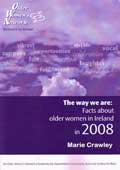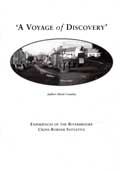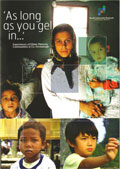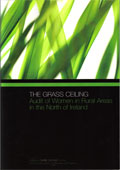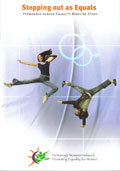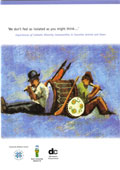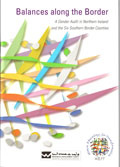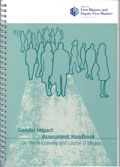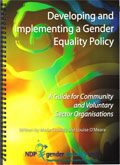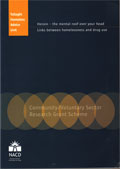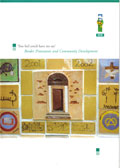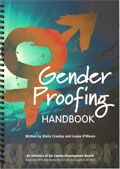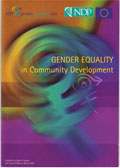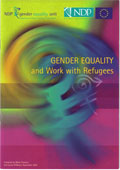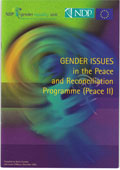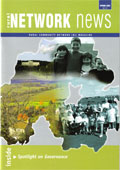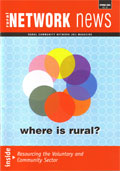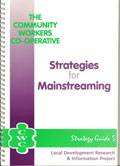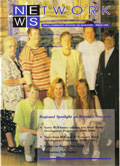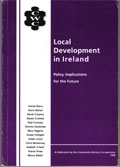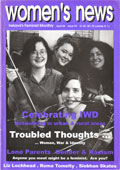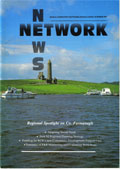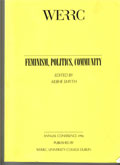
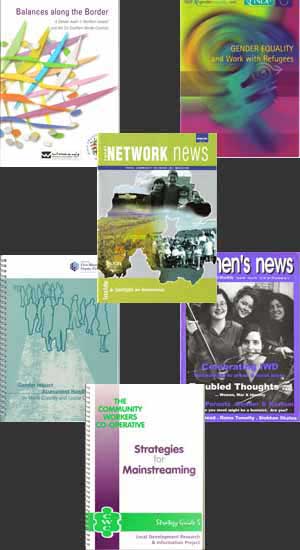
Books and Reports Articles in Journals
For more information on our publications and copies of some of the books, reports or articles we have produced and which reflect the scope of our work please select from above.
Some publications are in PDF format. If you need a small free PDF reader, please click here for the FoxIt PDF Reader.
Books and Reports
The way we are ....Facts about older women in Ireland in 2008 more ...
A Voyage of Discovery: Experiences of the Riverbrooke Cross-Border Initiative more ...
As long as you Gel in ...: Experiences of ethnic minority communities in Co. Fermanagh more ...
The Grass Ceiling: an audit of women in rural areas in the North of Ireland more ...
Stepping out as equals: Fermanagh gender equality baseline study more ...
We don’t feel as isolated as you might think: Catholic Minority Communities more ...
Balances along the border: a gender audit in Northern Ireland and the Border Counties more ...
Gender Impact Assessment Handbook more ...
Developing and Implementing a Gender Equality Policy more ...
Heroin - the Mental Roof over your Head more ...
You feel you'd have no say - Protestant Communities in Border Areas more ...
The Gender Proofing Handbook more ...
Gender Equality in Community Development more ...
Gender Equality and work with Refugees more ...
Gender Issues in the Peace and Reconciliation Programme more ...
Articles in Journals
To govern or to be governed - that is the question more ...
“If it is good to empower women in 1998, why is it not in 2003”? more ...
Negotiating the Mainstream - A Rural Women’s Network Perspective more ...
From Listening Ears to Belly Dancing - Networking the Fermanagh Way more ...
Networking with Rural Women’s Groups more ...
Women’s Networks - the emerging voice in Rural Communities I more ...
Women’s Networks - the emerging voice in Rural Communities II more ...
The Reality of Women’s Studies in Community Based Education more ...
|
|
|
|
|
|
‘The way we are: Facts about older women in Ireland in 2008’This factsheet provides gender specific policy data as it relates to older women. The main themes addressed are Health, Income, Employment and Risk of Poverty, Housing, and Access to Transport and Information. General information on older women as well as an overview of relevant government policies and programmes are also provided in the report. Crawley M (2009) “The way we are: Facts about older women in Ireland in 2008.” Published by the Older Women’s Network (OWN), Dublin You can download a copy here (PDF 1.12 MB Large File! ) |
|
|
|
|
|
|
|
‘A Voyage of Discovery:
|
|
|
|
|
|
|
|
“As long as you Gel in ...”: Experiences of ethnic minority communities in Co. FermanaghThis report is the final one in a three part series which documents the experiences of minority communities in the North of Ireland. ‘As long as you gel in...’ provides an insight into the daily experiences of recently arrived migrant workers, long term members of ethnic minority communities and members of the Travelling Community in Co. Fermanagh. Crawley M (2007) “As long as you Gel in ...”: Experiences of ethnic minority communities in Co. Fermanagh. Published by and copies available from Rural Community Network NI You can download a copy here (PDF 600 KB) |
|
|
|
|
|
|
|
‘The Grass Ceiling:
|
|
|
|
|
|
|
|
‘Stepping out as Equals:
|
|
|
|
|
|
|
|
‘We don’t feel as isolated as you might think...’
|
|
|
|
|
|
|
|
‘Balances along the border’: A gender audit in Northern Ireland and the six southern border countiesThis research report presents an audit of gender representation on decision making bodies in the North of Ireland and the six border counties of southern Ireland. The report also contains a brief overview of gender mainstreaming as a response to gender inequality. Crawley M & O’Meara L (2005) Balances along the border: a gender audit in Northern Ireland and the six southern border counties. Published by WEFT and available from the WRDA, Belfast. You can download a copy here (PDF 635 KB) |
|
|
|
|
|
|
|
Gender Impact Assessment Handbook )This Handbook was produced by the Gender Equality Unit within OFMDFM to assist government departments to carry out a gender impact assessment on their policies to ensure that women and men are presented with equality of opportunity in relation to all policies and programmes. Crawley, M & O'Meara, L (2002 )'Gender Impact Assessment Handbook', published by the Gender Equality Unit within the Office of the First Minister and Deputy First Minister (OFMDFM), Belfast You can download a copy here (PDF 679 KB 84 pages) Also available in Armenian. |
|
|
|
|
|
|
|
‘Developing and Implementing a Gender Equality Policy’ :
|
|
|
|
|
|
|
|
Heroin - the Mental Roof over your Head -
|
|
|
|
|
|
|
|
You feel you'd have no say -
|
|
|
|
|
|
|
|
The Gender Proofing HandbookThe Gender Proofing Handbook was produced to provide information and practical assistance to those planning to gender proof strategies or development plans. The Handbook provides (1) an introduction and background information on the issue; (2) outlines why gender proofing is needed, and (3) suggests how to apply the gender proofing process to objectives and actions. Crawley, M & O'Meara, L (2002 )'Gender Proofing Handbook', published by and available from the NDP Gender Equality Unit, Dept. of Justice, Equality & Law Reform, Dublin (written in both Irish and English). English language version 1. Introduction (click here - 452 kb PDF file) Leagan Gaeilge 1. Réamhrá (Brú anseo - 446 kb PDF) |
|
|
|
|
|
|
|
This factsheet considers some general issues in relation to refugees and asylum seekers, outlines some gender issues in work with refugees, presents case studies of good practice and suggests actions which could be implemented by agencies and organisations working with refugees. This factsheet was researched and produced as part of a series commissioned by the NDP Gender Equality Unit to assist agencies and organisations responsible for the implementation of the National Development Plan. Crawley, M & O'Meara, L (2002) 'Gender Equality and work with Refugees', published by and available from the NDP Gender Equality Unit, Dept. of Justice, Equality & Law Reform, Dublin. You can download a copy here (PDF 3.8 MB Large File! )
|
|
|
|
Gender Equality in Community DevelopmentThis factsheet highlights gender equality issues in the area of community development and in local and community decision making structures. It presents models of good practice, both national and international and suggests actions to promote gender equality in the area of community development. The factsheet was researched and produced as part of a series commissioned by the NDP Gender Equality Unit to assist agencies and organisations responsible for the implementation of the National Development Plan. Crawley, M & O'Meara, L (2002) 'Gender Equality in Community Development', published by and available from the NDP Gender Equality Unit, Dept. of Justice, Equality & Law Reform, Dublin. You can download a copy of the factsheet here (PDF 2036 KB) |
|
|
|
|
|
|
|
Gender Equality and work with RefugeesThis factsheet considers some general issues in relation to refugees and asylum seekers, outlines some gender issues in work with refugees, presents case studies of good practice and suggests actions which could be implemented by agencies and organisations working with refugees. This factsheet was researched and produced as part of a series commissioned by the NDP Gender Equality Unit to assist agencies and organisations responsible for the implementation of the National Development Plan. Crawley, M & O'Meara, L (2002) 'Gender Equality and work with Refugees', published by and available from the NDP Gender Equality Unit, Dept. of Justice, Equality & Law Reform, Dublin. You can download a copy here (PDF 3.8 MB Large File! ) |
|
|
|
|
|
|
|
Gender Issues in the Peace and Reconciliation Programme
|
|
|
|
|
|
|
|
|
|
|
|
|
|
‘To govern or to be governed - that is the question’This article, published in a Network News edition that focused on the theme of governance briefly examines Section 75 in terms of its contribution to enhancing the role of women in governance in Northern Ireland. Crawley M (2005) ‘To govern or to be governed - that is the question’ Network News 41 24-25 Published by and available from the Rural Community Network NI You can download a copy of the journal here (PDF 1.72 MB) |
|
|
|
|
|
“If it is good to empower women in 1998, why is it not in 2003”?This article is a response to the Task Force position paper on resourcing the community and voluntary sector (entitled Pathways for Change). This response is from the perspective of the rural women’s sector and highlights the need for the critical role of the sector in affecting social change to be taken into account. Crawley M (2004) ‘If it is good to empower women in 1998, why is it not in 2003’? Network News 38 12-15. Published by and available from the Rural Community Network NI. You can download a copy of the journal here (PDF 1.2 MB) |
|
|
|
|
|
Negotiating the mainstream ...This paper was published in one of a series of strategy guides aimed at assisting community groups to translate mainstreaming theory into practical actions and to examine various strategies for mainstreaming. The paper outlines the experiences of a rural women's network in the North of Ireland in developing and negotiating an effective gender mainstreaming agenda. In particular, it describes practical actions undertaken, elements of good practice and highlights challenges and concerns around the implications for gender specific work. Crawley, M. (2000). ‘Negotiating the Mainstream - A Rural Women’s Network Perspective’ in Strategies for Mainstreaming, Published by and available from the Community Workers Co-operative NI You can download a copy here (PDF 103 KB) |
|
|
|
|
|
From Listening Ears to Belly Dancing...This article provides an insight into the nature of local development work with rural women in the North of Ireland and outlines the benefits of this work to rural communities. Crawley, M. (1999). ‘From Listening Ears to Belly Dancing’ - Networking - the Fermanagh Way’, Network News, Published by and available from the Rural Community Network NI You can download a copy here (PDF 70 KB) |
|
|
|
|
|
Networking with Rural Women's Groups -
|
|
|
|
|
|
Women's Networks - the emerging voice in rural communities IIThis article considers some of the issues which emerge in linking local community based women's development to initiatives which pursue a policy agenda and in particular, it examines the challenge in linking local rural women's development to the wider rural development agenda. Crawley, M. (1998). ‘Women’s Networks - the emerging voice in Rural Communities II’, Women’s News, Belfast. You can download a copy here (PDF 72 KB) |
|
|
|
|
|
Women's Networks - the emerging voice in rural communities IThis article considers some of the issues which emerge in linking local community based women's development to initiatives which pursue a policy agenda and in particular, it examines the challenge in linking local rural women's development to the wider rural development agenda. Crawley, M. (1997). ‘Women’s Networks - the emerging voice in Rural Communities I’, Network News. Published by and available from the Rural Community Network NI You can download a copy here (PDF 69 KB) |
|
|
|
|
|
The Reality of Women's Studies in Community Based EducationThis paper explores the position of women's studies in a community education setting, and in particular explores the factors which contribute to many women's reluctance to engage in this area of study. Recognising its importance in raising critical awareness of gender issues at a local level, this paper suggests ways in which women's studies could be made more appealing to the majority of women. Crawley, M. (1996). ‘The Reality of Women’s Studies in Community Based Education’ in ‘ Feminism, Politics, Community’,Ed., Ailbhe Smyth, Women’s Education Research and Resource Centre, University College, Dublin. You can download a copy here (PDF 91 KB) |
|
|
|
